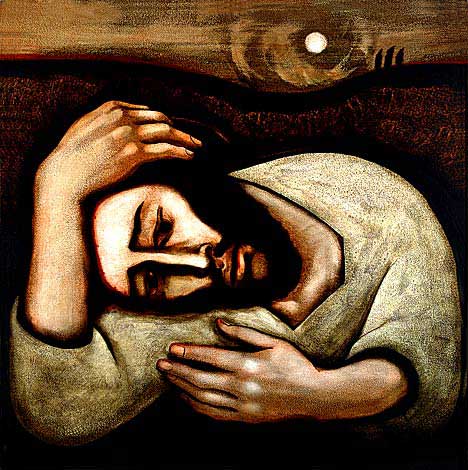But one of those who stood by drew his sword,
and struck the slave of the high priest and cut off his ear. And Jesus said to
them, "Have you come out with swords and clubs to arrest me, as you would
against a rebel? Every day I was with you in the temple teaching, and you did
not seize me; but this has taken place to fulfill the Scriptures." And
they all left Him and fled. A young man was following Him, wearing nothing but
a linen sheet over his naked body; and they seized him. But he pulled free of
the linen sheet and escaped naked.
Mark has not said that the disciples came to where Jesus
was being arrested, but clearly they were there—he was defended by one and
“they” all fled, just as Jesus predicted the disciples would scatter.
One of the disciples (we learn in another
gospel it was Peter) cuts off one of the high priest’s servants ears. This indicates that they were ready to fight,
to defend Jesus with their lives, if they have to. Jesus' response to his arrest, however
confused them. Jesus first complains
about the arrest—he says that it is too much like how one would arrest a rebel,
not a citizen. Jesus says that they
could have come at any time in Jerusalem and taken him away. The implied statement is that he would not
have resisted then, and he will not resist now.
He is not a rebel. Then he
concludes that the arrest only happened this way because it needed to fulfill
what was written in God’s word—God’s promises had to be fulfilled.
The disciples, however, were expecting Jesus
to resist arrest. They were expecting a
rebellion to take over Jerusalem, and now seemed a good time to start. But Jesus was allowing them to take him
away—and then he says that this arrest was according to God’s plan. Because of their confusion, they didn’t know
what to do, so they ran away—just as Jesus had predicted they would according
to the Scriptures (Mark 14:27). The young
man running away naked is a mystery in the book of Mark—only mentioned in this
gospel. Some have speculated that it is
Mark himself, showing what he did on that night—but it is not known. At the very least, the man shows the shame of
the disciples’ running, for nakedness is a great shame in that culture.
Okay, we are assured that when bad things happen, God is getting us ready for a victory. What happens when the victory doesn't come? God is acting strange. As if He WANTS us to fail. As if he's not going to deliver us from the horror that our enemies plan for us. First, he prepares us for victory, and then He sets us up to fail! What kind of God do we have?
We need to remember that God isn't the power that snatched victory out of the jaws of defeat. He is the God of resurrection. He creates victory after defeat and death have already won. If we expect a last-minute victory, then we haven't waited long enough. God will grant us victory long after our enemies have declared us dead. Our job is to keep our resolve and keep waiting. The one who endures past the end will be saved.







